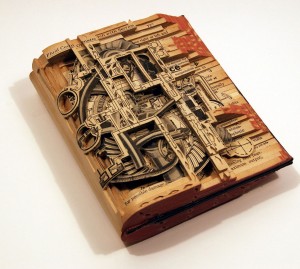At the onset of e-reading brought on by the flood of dedicated devices to the market, the reading community seemed fairly well divided into two camps: those who embraced digital reading, and those who steadfastly refused to relinquish paper. While the first get praised e-readers for their portability and storage capabilities, the print fans insisted that nothing could replace the experience of a bound book.
A piece by Rachel Arons for The New Yorker discussed the differences in so-called book fetishists, people who treasure printed books as an object of beauty, and not just for their literary value. While it may be easy to dismiss these collectors as what the name implies–people suffering from a severe fetish for print media–they are actually a driving force in the book industry.
As Arons points out, there are whole niche markets for these book fans, such as a perfume based on the smell of an old book and a spray that is e-reader safe but that will make the device smell like a book. There are whole art genres based on pieces made from collected book materials, gallery pieces that adorn the owners’ walls with…books.
While these fans might be a dying breed as more and more consumers turn to the price and convenience of ebooks, the publishing industry is still feeling the effects of a market driven by print fans. A number of surveys have cited the responses from consumers who have embraced the digital revolution themselves, yet still prefer print books for their children, stating that they want their children to experience holding a book and developing a love for reading. And the value that some consumers place on printed books can still be seen in the ongoing debate over what prices should be for books, both print and digital.
Even as e-screen technology improves and tablets support a very real simulated turning effect, the fact remains that industry watchers’ predictions from only a couple of years ago are proving true: there will be no death for either paper or digital, as both formats have their place in consumers’ hearts and wallets.
Mercy Pilkington is a Senior Editor for Good e-Reader. She is also the CEO and founder of a hybrid publishing and consulting company.
